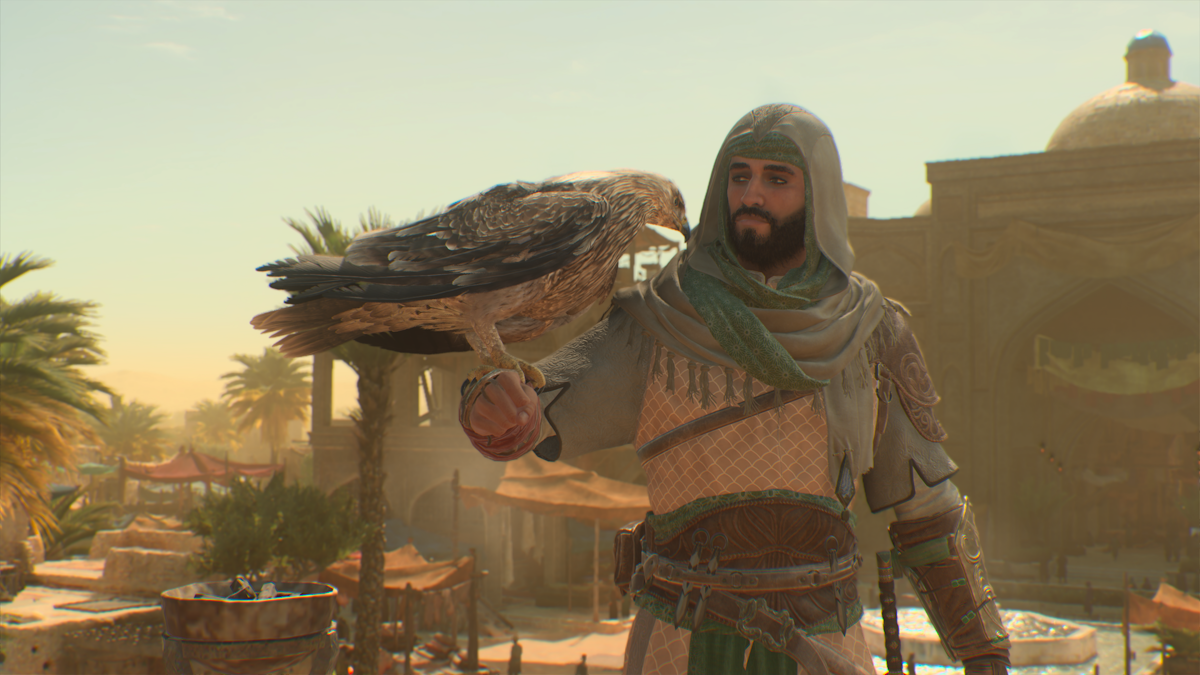Since the first Assassin’s Creed, we’ve had over sixteen years and almost as many major installments in the series. However, we will never see a game like the first part again. The parts kept getting bigger and bigger, and became less and less about playing an assassin. Assassin’s Creed Mirage goes back to the basics of the series, but nostalgia is sometimes a bad advisor.
Assassin’s Creed Mirage takes place in Baghdad at the end of the ninth century. This time the main role is of an old acquaintance: Bassem. When we meet him in Assassin’s Creed Valhalla, he’s already a seasoned assassin with a dual agenda. In Mirage, he is still a young street rat, spending his days doing some menial work until something suddenly happens that makes him join the Invisibles. Sounds like ABC.
A confusing introduction to a well-known institution
However, Ubisoft has managed to deliver the most confusing introduction ever to the series. For the first few hours, names and locations are thrown around, and the game moves from one topic to another. The weird “coming of age” montage in particular completely misses the point because it doesn’t feel like a single day has passed in the rest of the game world.
When you finally start the game, Assassin’s Creed Mirage is incredibly easy. The game is built on the same foundation as Valhalla, Odyssey, and Origins, but without as much baggage. So, the same controls and menus, but not a hundred thousand different weapons, skills, and question marks on a frighteningly large map. This is both a blessing and a curse.
Detectives and killers
Without the axes, beards and boat trips, Assassin’s Creed is once again about playing the role of an assassin. The annihilation of members of The Order was of course still in the later installments, but it actually became a side issue. Here this system is amplified. You must first track down and unmask each target before you can strike them.
There’s more meat to this detective work in Mirage than previous games, although you still don’t have to be named Sherlock Holmes to solve the case. The actual killing of your target is a type of lethal killing a light. There are always a few different ways to explore, but in the end they all have the same result.
Baghdad in quick succession
So Assassin’s Creed Mirage keeps the momentum going, but many of the kills also feel interchangeable due to the relatively high pace. You rush from goal to goal, without really thinking about anything. The long adventure in a large market stands out in a positive way and brings out the best in Mirage. The mission is carefully crafted to eliminate your target, and is also set in one of the most authentic locations in the game.
The colorful spices and rugs in the stalls pop from the sandy brown display, while the chromatic aberration gives the whole a warm, almost dreamy look. Although the color separation is sometimes too aggressive and we would have liked to have the option to reduce or turn it off, it cannot be denied that Bagdad is very atmospheric. So it’s easier to take frame drops in busier locations for granted.
Other tasks seemed more routine by comparison, such as randomly stabbing a soldier on the streets of Baghdad. The game could have slowed down the tactical throttle a bit more often, in order to highlight actual aerial locations and assassinations.
History repeats itself
It also doesn’t help that the goals in question are incredibly interchangeable. From the start of the game, people point very loudly in their direction and shout “These are the bad guys, they need to die!”, and no one makes a critical comment. As a player you have to get that motivation from previous matches. The existence of the Isu/those who came before has been reduced to a trivial fact that no one really notices, and nothing has been done with Bassem’s dual agenda from Valhalla. Shohreh Aghdashloo’s acting talent, among others, is greatly underutilized in such a tender story.
It is an art to make a good introduction, where the end point has already been determined. Mirage misses the mark in that area and above all adds nothing to the existing Assassin’s Creed canon. Mirage adds something to your overall development: brief history lessons about certain buildings, the city and local cultures are finally an integral part of the game again.
Perhaps Ubisoft itself should have looked at its history a little more. After all, Assassin’s Creed only broke the sequel. The game’s expanded, more interesting world and more memorable characters dwarfed the 2007 original in every respect. With Assassin’s Creed Mirage, the series does return to its origins after sixteen years, but in retrospect this origin also turns out to be somewhat unclear.
Assassin’s Creed Mirage is available now for PlayStation 4, PlayStation 5, Xbox One, Xbox Series The game will also come to the iPhone 15 Pro in 2024.
Assassin’s Creed Mirage
OK
Conclusion
If you get stripped down enough, you’ll end up wearing your shirt. Assassin’s Creed Mirage faces this as well. Everything that is not related to assassinations is deleted, and nothing new is added either. The result is sometimes nostalgic and entertaining, but ultimately as fleeting as a mirage.
Plus minus points
Finally, it’s all about assassinations again
Goal tracking provides excellent structure
A few positive outbursts
A little too much color separation

“Lifelong zombie fanatic. Hardcore web practitioner. Thinker. Music expert. Unapologetic pop culture scholar.”








